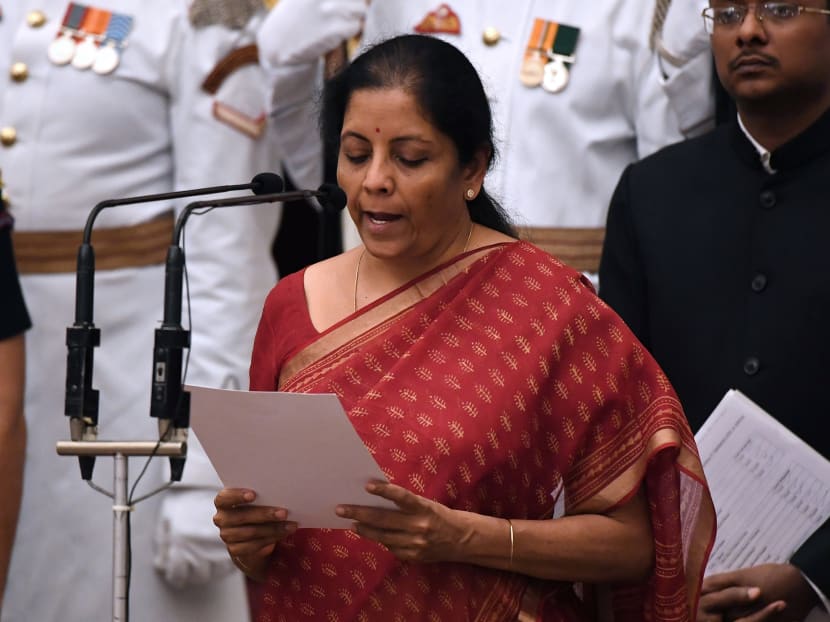India gets first woman defense head since 1982 amid border spats
NEW DELHI — Nirmala Sitharaman, who was appointed as India’s first woman defense minister in 35 years, will have to deliver on Prime Minister Narendra Modi’s goal of modernizing the nation’s Soviet-era military equipment as border tensions with neighbors China and Pakistan simmer.

India's ruling Bharatiya Janata Party (BJP) politician and member of parliament Nirmala Sitharaman takes the oath during the swearing-in ceremony of new ministers at the Presidential Palace in New Delhi, India, September 3, 2017. Photo: Reuters
NEW DELHI — Nirmala Sitharaman, who was appointed as India’s first woman defense minister in 35 years, will have to deliver on Prime Minister Narendra Modi’s goal of modernizing the nation’s Soviet-era military equipment as border tensions with neighbors China and Pakistan simmer.
Most recently the country’s Minister for Commerce and Industry, Ms Sitharaman was India’s main negotiator at global trade talks and succeeds Finance Minister Arun Jaitley who relinquished his additional charge of the key ministry. Prior to her ministerial stint, she was a prominent party spokeswoman for the ruling Bharatiya Janata Party during Mr Modi’s successful election campaign in 2014.
Under Ms Sitharaman, export growth has slowed while free trade agreements with key partners are progressing slowly. In her new role she will have to accelerate Mr Modi’s goal of spending as much as US$250 billion (S$339 billion) by 2025 on defense hardware, including jet planes, naval ships and drones as bigger neighbor China flexes its military muscle in the region. Her commerce ministry duties also gave her oversight of Modi’s flagship “Make in India” program aimed at boosting domestic manufacturing, an initiative that included a significant defense focus.
“Sitharaman’s elevation to defense is a bit of a surprise,” said Mr Shailesh Kumar, a senior Asia analyst with the Eurasia Group risk consultancy, who added that she did not have any particular “break-out” policies in her previous post. “Her selection is likely aimed at leveraging her experience in the commerce ministry to make defense as much about economics as security.”
While she doesn’t have the political heft of her predecessors including former President Pranab Mukherjee and ex-Prime Minister Indira Gandhi, she is known as a hardworking member of Mr Modi’s team and shares a good rapport with the premier. Ms Sitharaman takes over amid increased tensions with Pakistan and China, as well as active insurgencies in India’s east, northeast and in the disputed region of Kashmir.
India and China on Aug. 28 agreed to end a months-long military standoff in the Himalayas, with both sides seeking to portray the withdrawal as a victory.
Ms Sitharaman also inherits a bureaucratic ministry known for equipment procurement delays, oversight of around 1.4 million active armed forces personnel and a politically sensitive portfolio that straddles everything from veterans’ pension issues to national security challenges.
One of her most important tasks will be modernizing the country’s aging defense equipment and the enormous army, which has grown over the years even as rivals such as China have streamlined and modernized their armed forces.
“Her biggest challenge will come from right-sizing the force structure, procedural hindrances in defense procurement and issues related to self-reliance in defense production,” said Mr Deba Ranjan Mohanty, director at the Indike Analytics, a New Delhi-based defense research organization, who suggested her “diligence” will help her “quickly pursue reforms” that could help increase localized defense production.
She previously worked as a research manager for audit firm Pricewaterhouse in London and has a masters in economics from New Delhi’s Jawaharlal Nehru University.
Her promotion had its critics as export growth has slowed for four straight months and free trade deals including with the European Union have been languishing. That means the nation is missing the opportunity to boost manufacturing and employment, a key electoral promise for Mr Modi, who pledged to create enough jobs for one million youth joining the labor force every month.
Mr Modi is “rewarding a failure” said Mohan Guruswamy, chairman of the New Delhi-based Centre for Policy Alternatives. “It takes someone who understands strategy, technology and the operation of the forces to head it.”
While Ms Sitharaman did not respond to numerous calls for comment, she told reporters after her inauguration that “it just makes you feel sometimes that cosmic grace is there,” the Scroll reported.
Still her access to Mr Modi could help her get the defense ministry into shape.
“She is tough and smart, it’s a good choice,” said Mr Harsh Pant, an international relations professor at King’s College, London. “But bringing coherence to Indian defense has never been easy. Having this kind of confidence from Modi will certainly go a long way.” BLOOMBERG





